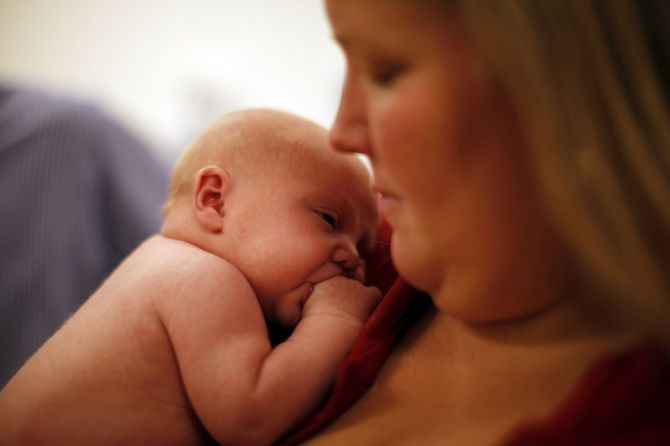Mother's Menopause May Predict Daughter's Fertility, Egg Count

A woman can predict her fertility and how much longer she has left to conceive from the age her mother went through menopause, according to a new study.
The new findings, published in the journal Human Reproduction, revealed that a mother's age at menopause can be used to predict the number of eggs remaining in her daughter's ovaries.
While previous studies have found a link between the age mothers and daughters go through menopause, the latest research provides more evidence that a woman's fertility is, to some extent, inherited from her mother.
In the latest investigation, scientists recruited 527 women between the ages of 20 to 40 and divided them into three groups: women whose mothers had an early menopause (younger than 45); women whose mothers had a normal menopause (46 to 54 years); and women whose mothers had a late menopause (older than 55).
Researchers assessed the number of eggs in the women's ovaries by determining the levels of their anti-Mullerian hormone (AMH) using blood samples and their antral follicle count (AFC) using a transvaginal sonography.
The AMH and AFC help doctors predict how many yet-to-be released eggs remain in a woman's ovary.
Researchers explained that follicles are clusters of cells that contain the immature egg. While the average woman is born with about two million follicles, only 400 will ever mature enough to release an egg for fertilization in her reproductive lifespan.
After adjusting for factors that could affect fertility like smoking, contraceptive use, age and body mass index, researcher found that average anti-Mullerian hormone levels declined by 8.6 percent, 6.8 percent and 4.2 percent a year in the women whose mothers had early, normal or late menopause, respectively.
The study also found a similar pattern in Antral follicle count, with annual declines of 5.8 percent, 4.7 percent and 3.2 percent in the same groups, respectively.
Researchers explained that the number of eggs remaining in a woman's ovaries affects her ability to conceive naturally, and both the number and quality of her eggs decline as she ages.
"Our findings support the idea that the ovarian reserve is influenced by hereditary factors. However, long-term follow-up studies are required," study leader Dr. Janne Bentzen, from the Copenhagen University Hospital, said in a statement.
Bentzen and her team also found that anti-Mullerian hormone levels and antral follicle count were significantly lower in women who used birth control pills, compared to women who didn't use the contraceptives. Additionally, the findings show that while antral follicle count in women whose mothers smoked while they were pregnant was on average 11 percent lower than those whose mothers did not smoke, anti-Mullerian hormone levels were not significantly different.
Researchers noted that the effects of birth control pills are most likely temporary and unlikely to influence the long-term decline in ovarian follicles. However, they warned that health care professionals and women should be aware of this fertility effect when considering women's reproductive life spans or any sort of fertility treatment.
Previous findings suggest that there is about 29 years between a woman's fertility starting to decline and the onset of menopause. For example, a woman who enters menopause at the age of 45 may have experienced a decline in her fertility at the age of 25.
"Our findings support the idea that the ovarian reserve is influenced by hereditary factors. However, long-term follow-up studies are required," Bentzen said.
Published by Medicaldaily.com



























